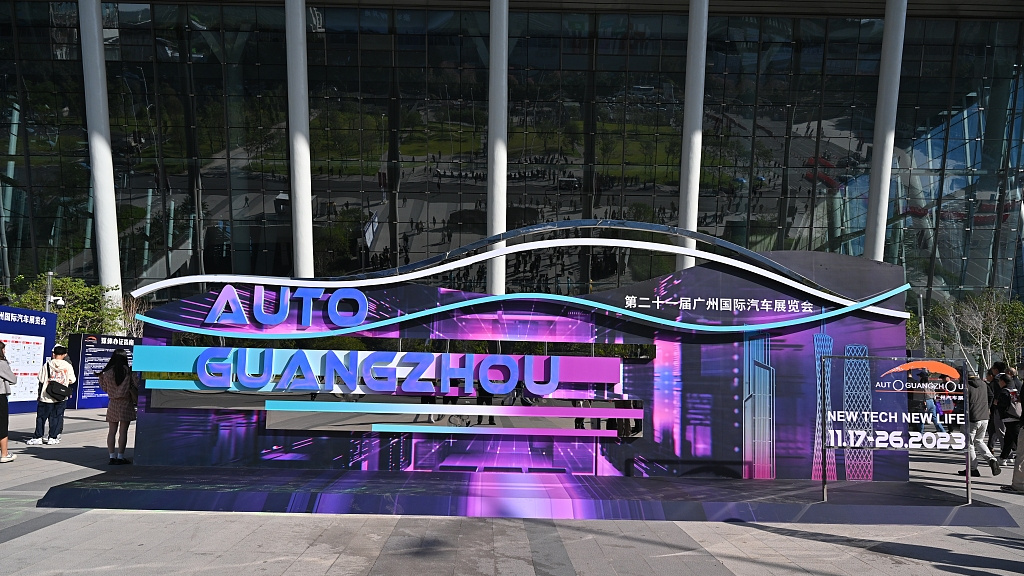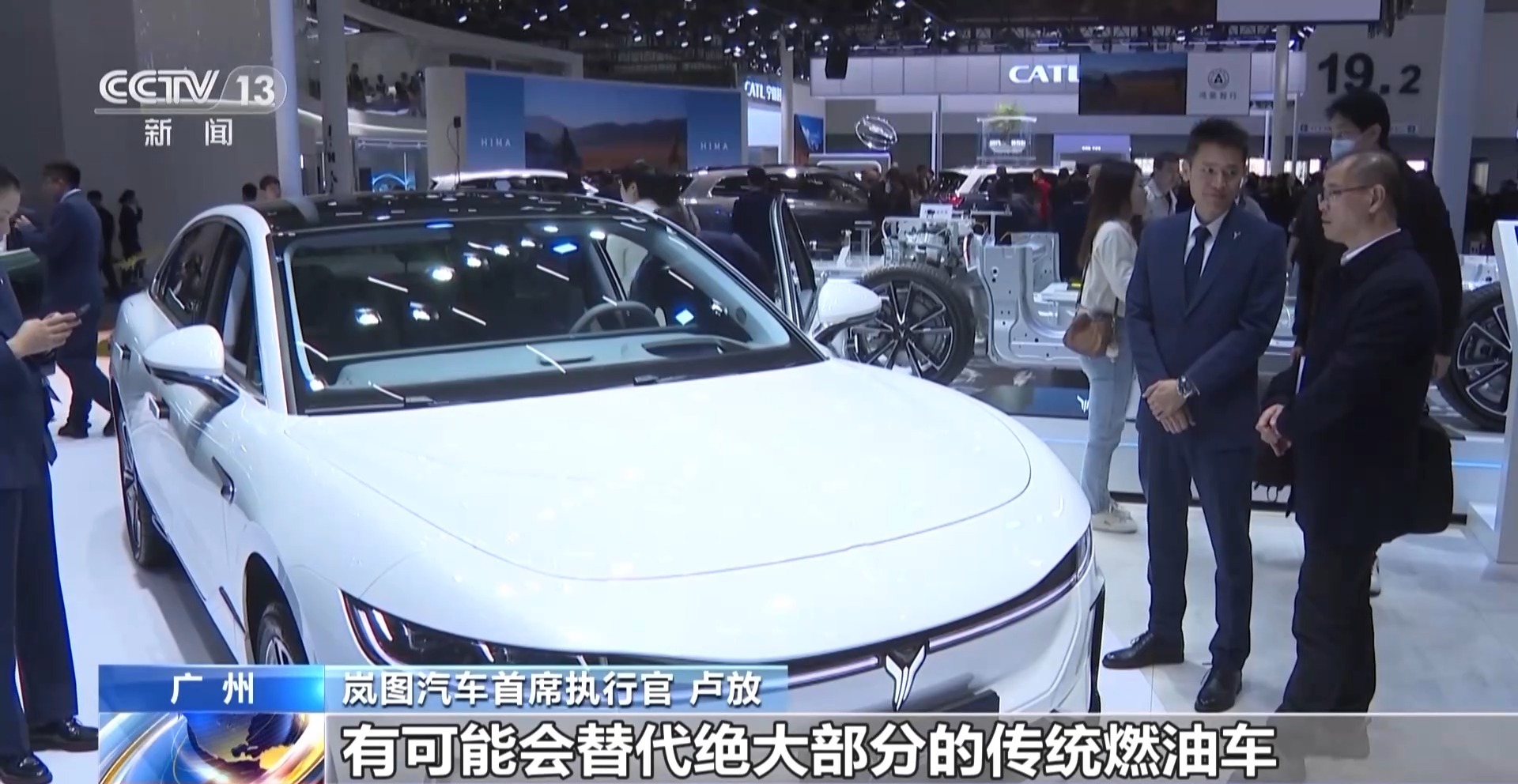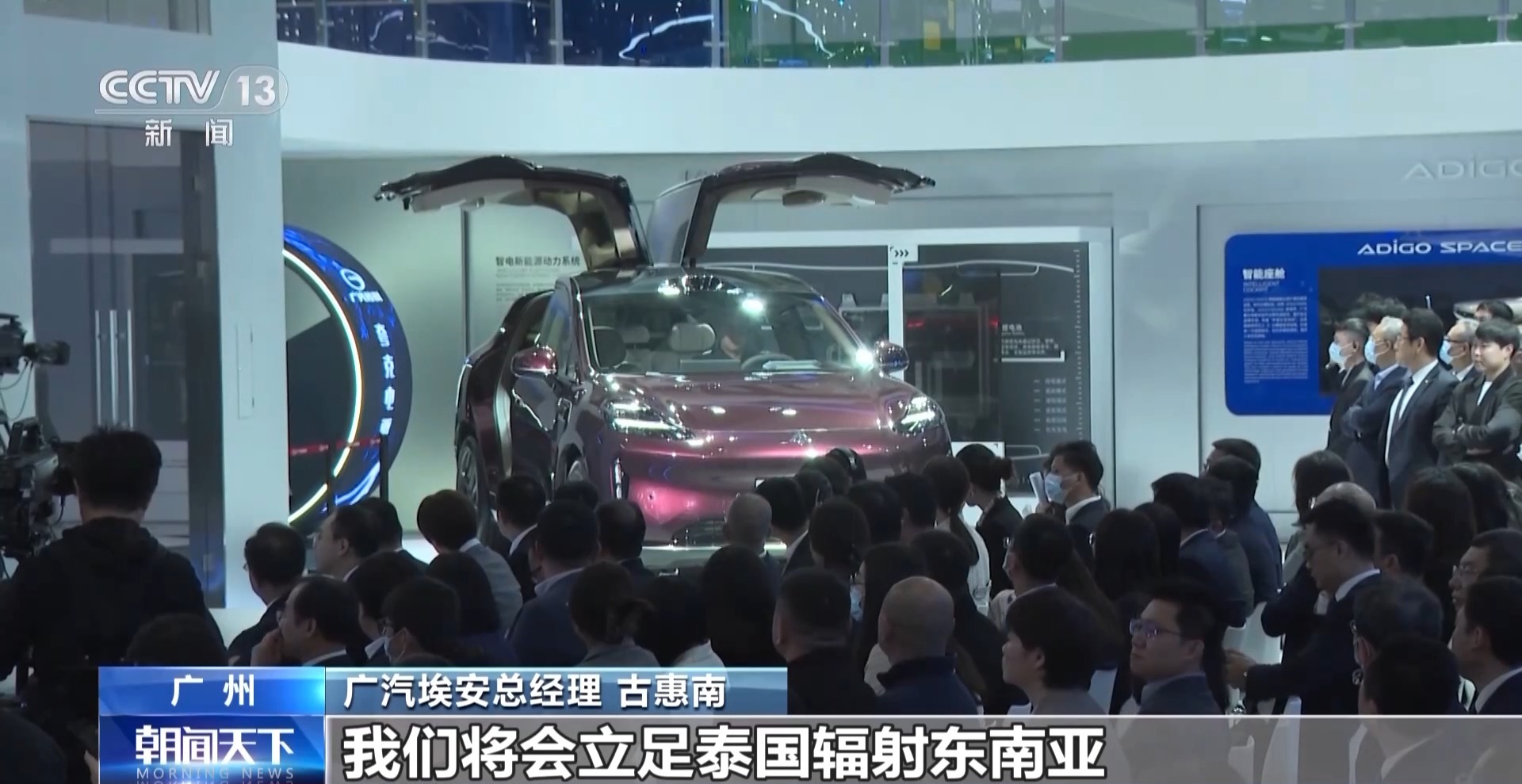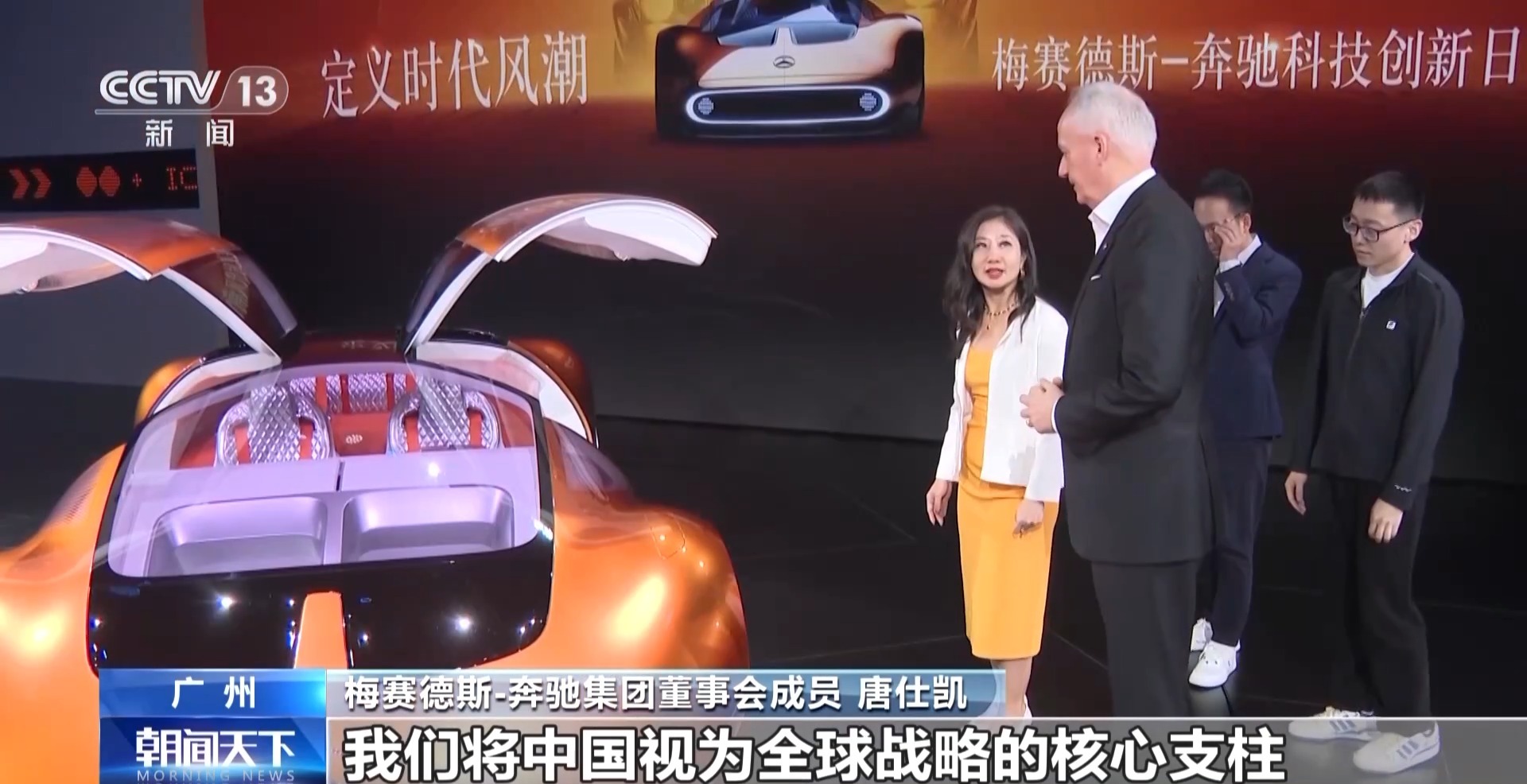Chinese NEVs ‘going global’ with tech breakthroughs, market confidence

A sign of the 21st Guangzhou International Automobile Exhibition in Guangzhou City of south China’s Guangdong Province, November 17, 2023. /CFP
A sign of the 21st Guangzhou International Automobile Exhibition in Guangzhou City of south China’s Guangdong Province, November 17, 2023. /CFP
The Chinese new energy vehicles (NEVs) are attracting the global attention at the 21st Guangzhou International Automobile Exhibition for major breakthroughs in technological and industrial developments, indicating domestic and international carmakers’ confidence in the Chinese market.
China was better known by major car manufacturers as one of the world’s largest markets and foundries at the fuel-powered vehicle age, and its leadership in the NEV supply chain is propelling robust growth in markets at home and abroad.
Official data showed that from January to October, China’s NEV sales reached 7.28 million units, up 37.8 percent on a yearly basis. Among them, nearly one million were exported to other countries, nearly double the level from a year ago.
This year, several Chinese auto companies have also signed agreements with foreign multinational carmakers on two-way technical cooperation, symbolizing that Chinese NEV manufacturers have entered a new age of technological exports.
The week-long exhibition, also known as the Guangzhou Auto Show, opened in Guangzhou City of south China’s Guangdong Province on November 17, and will last till this Sunday.
A total of 1,132 vehicles are on display, including 59 global debuts, 20 concept cars, and 469 NEVs (which accounts for over 40 percent of the total), and 350 units are homegrown automobile brands.

A model of Voyah PHEV on display during the 21st Guangzhou International Automobile Exhibition in Guangzhou. /CMG
A model of Voyah PHEV on display during the 21st Guangzhou International Automobile Exhibition in Guangzhou. /CMG
Technological breakthroughs
Chinese carmakers have displayed many cutting-edge products and technologies at the show, including the Super Electric Drive Intelligent Technology Platform, which delivers excellent performance and endurance for a vehicle.
The third-generation range extender, which is the core part of the platform, has an oil-electricity conversion rate that is nearly 10 percent higher than that of the second generation, according to the Seres Group, manufacturer of the platform.
A range extender is a fuel-based auxiliary power unit (APU) that extends the range of a battery electric vehicle by driving an electric generator that charges the vehicle’s battery.
Guo Feng, press spokesman for the Seres Group, a carmaker based in southwest China’s Chongqing Municipality, told CMG that “our intelligent technology platform gathers hybridity of vehicles applying diverse technical routes. It can meet the technical needs of a fully electric vehicle and also that of the extended-range NEVs.”
Also at the auto show, a number of plug-in hybrid electric vehicles (PHEVs) from Chinese brands met the public.
PHEVs are a combination of gasoline and electric vehicles, so they have a battery, an electric motor, a gasoline tank and an internal combustion engine.
“I think in the next five years, PHEVs are possible to replace most of the traditional fuel vehicles,” said Lu Fang, CEO of the Voyah, a Chinese luxury electric auto brand.
Official data showed that in the first 10 months of this year, the sales of PHEVs surpassed 2 million units, up 82.6 percent from a year earlier.
In order to alleviate the range anxiety of consumers, many new NEV models showcased at the exhibition have a range of more than 1,000 kilometers.
Chinese carmakers are leading the profound changes in the global auto market, especially in new energy vehicle development and manufacturing, according to industry insiders.
Xiang Xingchu, chairman of JAC Motors, a Chinese automobile and commercial vehicle manufacturer, told CMG that “the current transformation of the auto industry features an integrated development of multiple technologies and industries. The Chinese homegrown cars have come to the forefront of the world in the latest round of competitions, especially in intelligent electric vehicles.”

A car model of GAC Aion New Energy Automobile on display during the 21st Guangzhou International Automobile Exhibition. /CMG
A car model of GAC Aion New Energy Automobile on display during the 21st Guangzhou International Automobile Exhibition. /CMG
Chinese brands ‘going global’
Chinese carmakers say their competitive edge in technology has converted to an increased sales volume.
“Going global” has become a buzzword for many Chinese exhibitors at the event. Latest data show the country exported nearly four million vehicles in the first 10 months of the year, up 60 percent year on year, poised to become the world’s largest exporter.
The rapid export growth is largely driven by NEVs, an exhibitor said. In the third quarter of this year, 65 percent of the NEVs sold worldwide came from China.
“Basically, there is one new energy vehicle in every three new cars sold. It is estimated that a penetration rate of NEVs exceeding 32 percent is possible this year,” said Gu Huinan, president of GAC Aion New Energy Automobile.
The latest data show that, from January to October, China’s car sales totaled 20.045 million units, increasing 2.7 percent over the last year. In particular, the sales of NEVs have been rising at a faster pace.
Li Yunfei, general manager of BYD Branding-and-PR Division, told CMG that “over 70 percent of the world’s NEV batteries are from China. No matter in terms of industrial scale, or the supply of new energy batteries, China ranks among the top of the world.”
Xiang Xingchu, chairman of JAC Motors, the manufacturer partner of NEV marque Nio, also told CMG that “our exports have exceeded 200,000 units this year, at a growth rate of 80 percent, and are expected to hit around 250,000 units throughout the year, which is a record high.”
With substantial edges in industrial scale, the Chinese NEV marques export at prices far exceeding domestic rates.
“The unit price of our passenger cars in European market, if converted into RMB, is about double that of the domestic market,” said Lu Fang, CEO of Lantu Automobile.
The auto industry exports grew from less than $1.6 billion in 2001 to more than $121. 2 billion in the first eight months of 2023, with its market share climbing up from 0.65 percent to 5.5 percent.
Confident to bite off a larger share in foreign markets, Chinese electric vehicle firms are rapidly going global through direct exports as well as building overseas factories.
Gu Huinan, president of Aion, a NEV marque owned by Guangzhou Automobile Group Co., Ltd. (GAC), told CMG that “now we are preparing to build a factory in Thailand, and based on Thailand we will radiate to Southeast Asia.”
“On the other hand, we are also deploying our global footprint, with our future industrial bases built in Europe, North America, Africa and the Middle East. We will bring high-end EVs to the world.”

A car model of Mercedes-Benz Group AG on display during the 21st Guangzhou International Automobile Exhibition. /CMG
A car model of Mercedes-Benz Group AG on display during the 21st Guangzhou International Automobile Exhibition. /CMG
Growing confidence in Chinese market
At the Guangzhou Auto Show, many multinational automakers announced their plans to expand investment in China.
Hubertus Troska, member of the Board of Management of Mercedes-Benz Group AG, told CMG that “we see China as a core pillar of our global strategy. I’m utterly convinced of the future potential of China. This is why we will continue to invest in our business here.”
According to the insiders, as China’s policies to stabilize economic growth continue to show their cumulative effect, plus local authorities’ measures like car purchase subsidies and promotions, market demands for cars will continue to grow till the end of the year, and the automotive industry is hopeful to achieve its goal throughout the year.
Wang Du, assistant to the president of the China Automobile Dealers Association (CADA), told CMG that “we think that the automotive market, especially the passenger car market, is likely to grow at more than five percent throughout the year, giving people a big pleasant surprise.”
“We are leading the profound changes in the global auto industry, especially in NEVs. I believe that in the future, China’s auto industry and that of other countries can create a win-win situation together,” said Wang Xia, head of the auto industry division of the China Council for the Promotion of International Trade, a trade body directly under the Ministry of Commerce.

